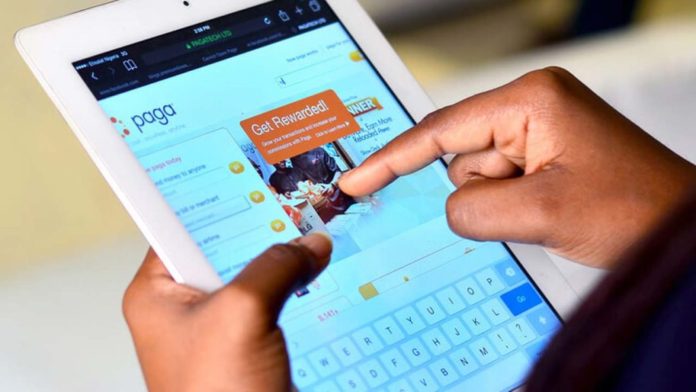By Pascal Oparada
Social Media/Tech Reporter
When Justus Agbedeh travelled to Oguta in Imo State for a journalism project, he took little cash along believing that he would have access to banking transaction there.
He was wrong.
To his chagrin, as developed as the sprawling ‘city’ looked, there was not a single bank in sight.
He consoled himself with the thought that as soon as the cash with him is exhausted, he would make do with whatever mobile money operators or agents of any bank he could find.
Wrong again.
Oguta was ‘dry’ in terms of modern financial services. To make any financial transactions, residents have to make the tortuous trip to Owerri, the Imo State capital.
This got Agbedeh thinking.
He immediately contacted Paga, one of Nigeria’s most successful mobile money operators.
Today, the presence of Paga has brought financial relief to Oguta residents.
The story of Agbedeh in Oguta underpins the extent of mobile money penetration and infrastructure development in Nigeria.
In the third quarter of 2018, only about 4.1% growth was recorded in mobile money transactions in Nigeria. That was a three-month growth in August of that year.
Data from the Nigeria Bureau of Statistics puts the total volume of mobile money transactions for August 2018 alone at N410.5 billion. This includes Point of Sales (PoS), USSD generated code operations and ATM transactions.
Nigeria Interbank Settlement System (NIBSS) records that mobile money transactions have crossed the N1 trillion mark in 2018
The market
As in Oguta, the market in many parts of Nigeria is ripe but the education and services are either missing or poor. Oguta is largely unbanked and untapped, hence Paga making a huge kill in that market.
Internet and mobile phone penetration in Nigeria has made mobile money transactions all the more vital.
The Nigeria Communications Commission (NCC) records that in 2018, active mobile phone users in Nigeria hit 146 million in January of that year. That is an increase of 2,233,467 lines from 144,631 in 2017.
It is estimated that about 154 million Nigerians would have access to the internet in 2021, an upsurge from 92.3 million in 2018.
This increase presents a huge market potential for the growth of mobile money transactions in Nigeria.
Dealing with trust
Mobile money transactions still reel from a trust deficit. Banks find it hard to reverse or return failed transactions on their platforms until the Central Bank of Nigeria (CBN) waded in with threats of sanctions for failed transactions that are not reversed within 24 hours.
“Nigerians do not fully trust mobile money operators just yet,” says Chibuike Goodnews, Co-founder of Dochase ADX, an internet advertising platform.
“The reason is that there is lack of education. You would be surprised to see that there are many back accounts without ATM cards attached to them,” Goodnews said.
Many believe the technology is not fully developed and is therefore susceptible to failures that can cause operators a great deal.
“One failed transaction and huge money go down the drain,” Chika Ibekwe, a supermarket owner said. “You know Nigeria businessmen and women do not have a good reputation in terms of return policies,” Ibekwe said.
Transacting business across any internet portal in Nigeria presents a lot of bumps in the form of security checks in order to secure the trust of customers or to vet the authenticity of customers.
In many advanced economies, it does not require more than two to three clicks before transactions worth millions are done.
Banks, Telcos and payment systems in Nigeria
Majority of banks in Nigeria rely on telecommunication companies (Telcos) to carry out mobile money transactions. Despite this, the banks see Telcos as threats to their access to the mobile money market.
Africa’s largest Telco, MTN, applied for a license in 2018 to operate mobile money services in Nigeria. This presents a huge challenge to many banks which see this as an incursion into their main operational market. The banks are still kicking against this and have protested to the CBN.
Even though MTN has had a fractious relationship with the apex bank with CBN accusing it of illegal repatriation of huge sums of money in dividends to its South African home country in 2018, it will still go ahead with the license given the size of Nigeria’s unbanked population.
Other Telcos may follow suit and apply for mobile money services in Nigeria given their coverage and their improved service delivery.
Messaging giant, WhatsApp is already testing mobile payment system in countries like India, and when perfected, analysts believe they will look the way of Africa and Nigeria in particular.
If this happens, the vast untapped mobile money market in Nigeria, rather than being saturated, will become robust and better liberalized, giving consumers a plethora of choices. And this will, in turn, result in economic improvements.
Already, many banks use messaging apps like WhatsApp and Facebook messenger in their operations but only as chatbots.
Many mobile money operators report resistance from banks with some of these banks launching their own mobile money systems – like GT Money.
One of Nigeria’s successful mobile money operators, Paga, reports that about seven banks are partnering with it to provide mobile money transactions in Nigeria. That is minuscule compared to the number of banks operating in the country.
Developing critical infrastructure
Critical to the successful and seamless mobile money services in Nigeria is unfettered access to functional infrastructure.
Jude Agabi, a staff of MainOne Cable, a leading provider of telecom service and network solutions in Nigeria, says that getting states in Nigeria to grant Telcos the right of way to lay fibre optics is bureaucratic and the Telcos go through layers of approvals before they can lay critical infrastructures.
“This portends huge obstacle to the growth of whatever other companies want to do in terms of internet availability and access,” Agabi said.
“Unless Nigeria fights the bureaucracy that stands in the way of internet access through legislation, it shall still lag behind in many years to come,” he said.













